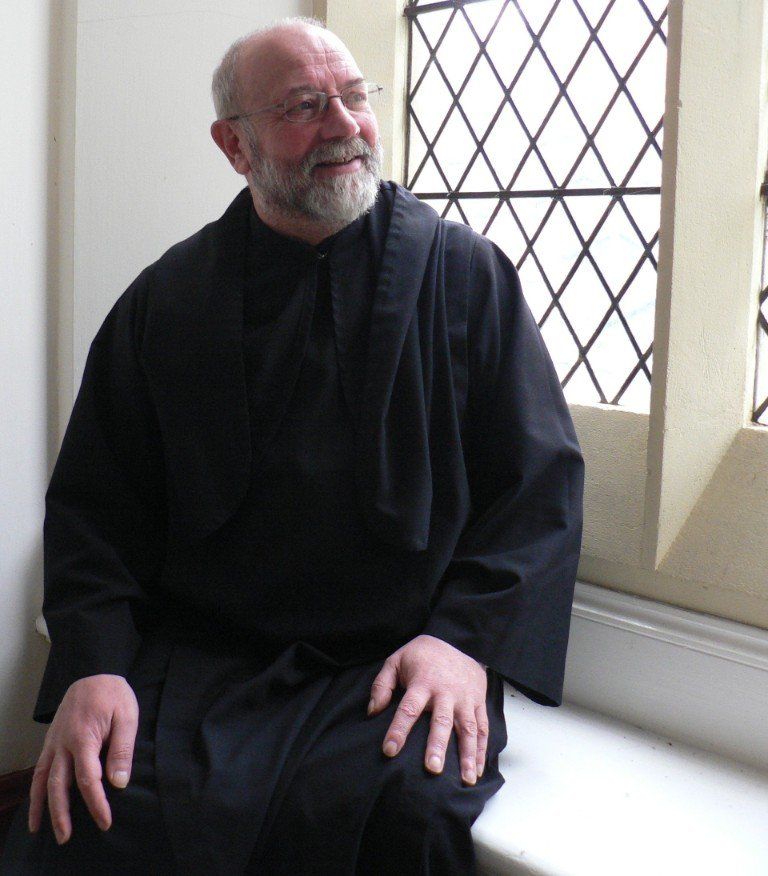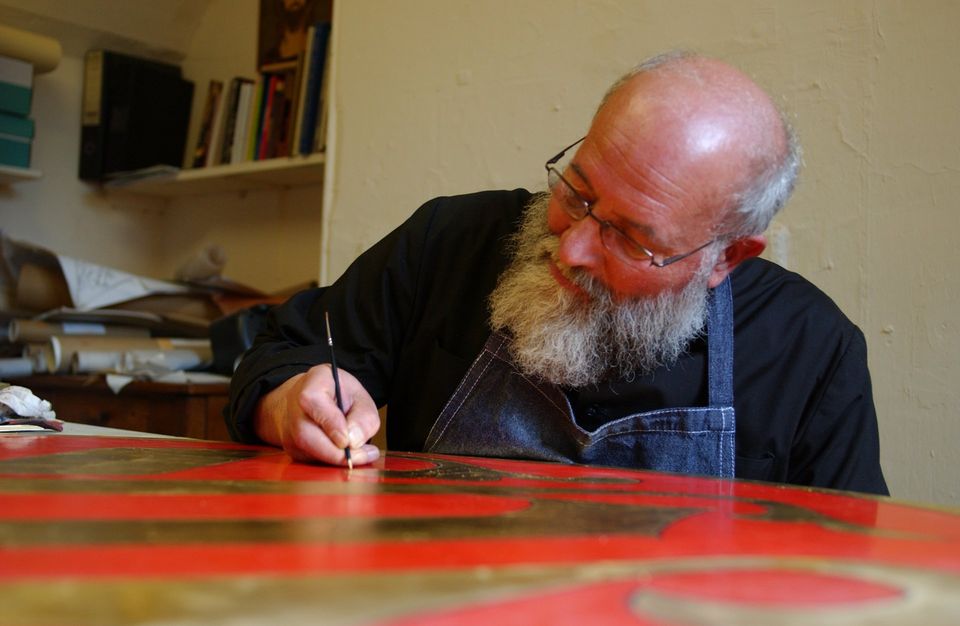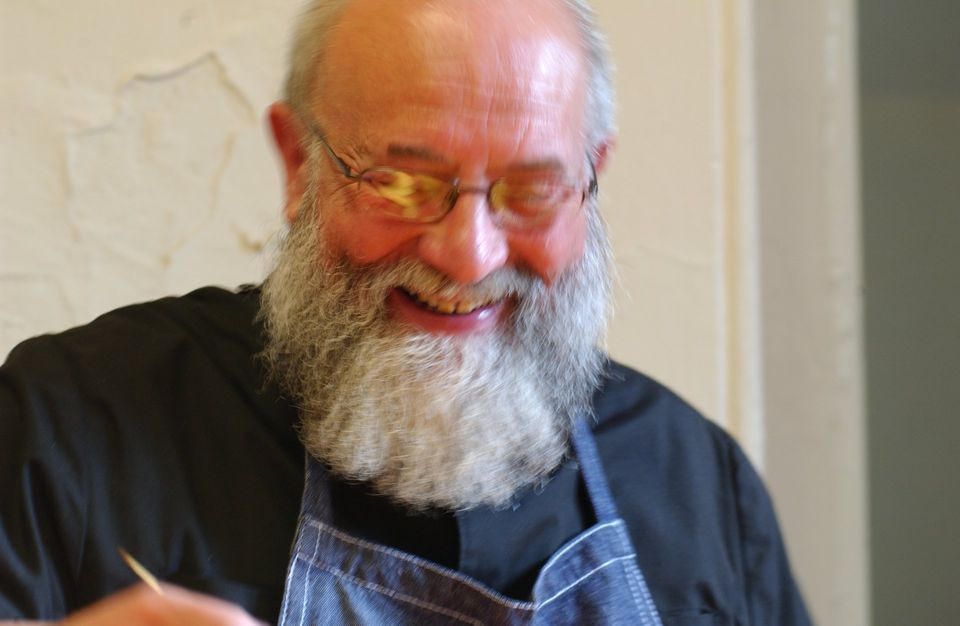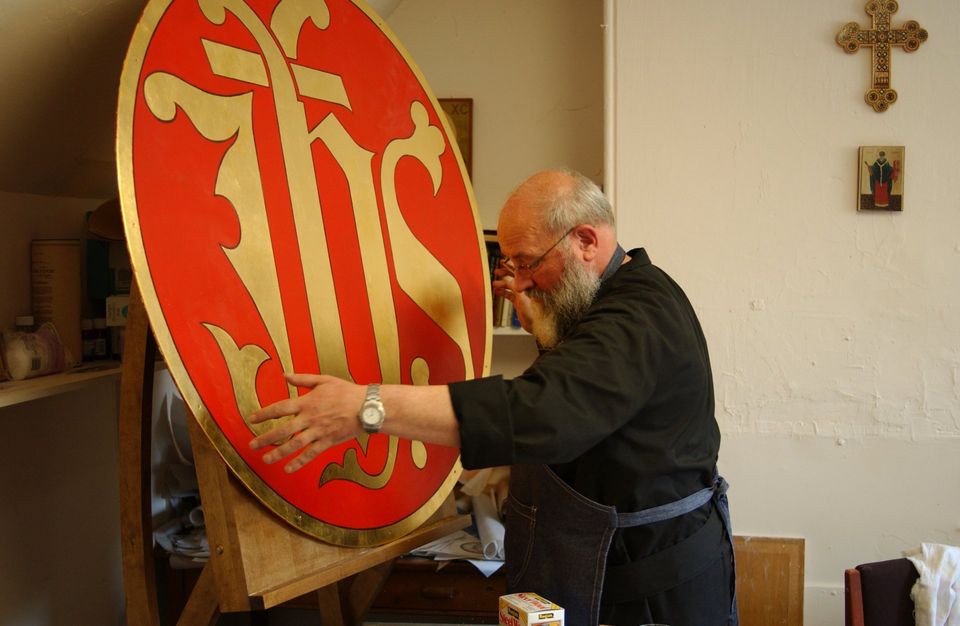Dom Dyfrig Harris
Fr Dyfrig spent time in the School as teacher and housemaster, and later served as a parish priest. St John's Gospel nourished his spiritual life and he developed an interest in Icons and the Byzantine tradition, including the writing of Icons.
“The virtuous man, though he die before his time, will find rest. Having come to perfection so soon, he has lived long; his soul being pleasing to God, he has hurried away from the wickedness around him.” These words from the Book of Wisdom are God’s answer to our questions, “Why? Why did he die so young?” Fr Dyfrig, to our way of thinking, did die “before his time”, just a few months after his 63rd birthday. There was so much still to do and, judging from the many tributes received this past week, many people who still needed his prayers and advice, his example and friendship. But “having come to perfection so soon, his soul being pleasing to God,” he was ready to die and prepared to meet his loving Father, whom he had served so faithfully throughout his life. Through the eyes of faith we can see, without a shadow of a doubt, that death for Fr Dyfrig was a reward for repentance and not a punishment for sin, the angel of death a welcome friend and not a feared adversary. Truly, “grace and mercy await” Fr Dyfrig, “the chosen of the Lord.”
St Paul, writing to the Romans, said, “If in union with Christ we have imitated his death, we shall also imitate him in his resurrection.” Fr Dyfrig, as we all know, was a man of faith. He lived and breathed Christ, whose living word, the Gospel, he avidly studied, lovingly meditated and powerfully preached. We all admired the integrity of his life, his unwavering faith, his devotion to the Church in all her richness and poverty and his ardent desire to enter fully into the mystery of Christ. We are grateful for what he shared with us: the overflowing joy of knowing Christ, the varied gifts of the Holy Spirit and the serene comfort that comes from knowing that we are our heavenly Father’s beloved children. In his suffering, and not only in his final illness, Fr Dyfrig always united himself to Christ, imitating his death, in the sure hope of sharing in his resurrection. St Benedict writes in the Holy Rule, “ As we progress in this way of life and in faith, we shall run on the path of God’s commandments, our hearts overflowing with the inexpressible delight of love. Never swerving from his instructions, but faithfully observing his teaching in the monastery until death, we shall through patience share in the sufferings of Christ that we may deserve also to share in his kingdom.”
Fr Dyfrig had a special love for St John’s Gospel. Who can forget his classes and sermons or just going for a walk around the garden and listening to his latest insights and discoveries? If only he had written a book! We heard just now a short passage from the “Farewell Discourse” given to the disciples at the Last Supper. “Do not let your hearts be troubled. Trust in God still and trust in me.” There were times in his life when Fr Dyfrig, like all of us, was troubled, but never did he stop trusting in God and trusting in the Lord Jesus. He encouraged us to trust and to put our hope firmly in God. “I am the Way, the Truth and the Life. No one can come to the Father except through me.” The life of a Christian and the life of a Benedictine monk are centred on Christ, who alone is the Way, the Truth and the Life. If there is one word we can use to describe Fr Dyfrig it is Christocentric. He made his own the words of St Paul, “It is not I who live but Christ who lives in me.” He loved the Sacred Priesthood and was so proud of his vocation and grateful for the precious gift of representing Christ at the Altar, the Font, the Confessional, the bedside of a dying person or wherever else a priest is called to be. At times he could appear pompous or exaggeratedly devout as he presided at the Liturgy, but this was really a sign of the fear and trepidation we should all sense as we approach the Throne of Grace, our unworthiness on the one hand, God’s mercy and loving kindness on the other. Although Fr Dyfrig had a wicked and vivacious sense of humour (Who can forget the raucous laugh?), he was aware more than most of the immense dignity bestowed on a priest at Ordination and on all Christians at Baptism.
Fr Dyfrig did not want me to say anything about him at his Requiem. “When it’s my turn, just talk about Christ the High Priest; just talk about the Resurrection,” he would say. However, I would be failing in my duty to him and to you if I said nothing, especially as the Gospel becomes incarnate in real people and the fascinating story of their lives. Kevin Charles Harris was born in Newport to Violet and Ivor Harris of Cwmbran on 29th October 1948, three years after his brother Michael. Theirs was a happy and devout Catholic home and life was centred on the parish church. He was a pupil at Our Lady of the Angels’ Primary, then at Fr Hill’s Secondary School, Newport, before going on to St Alban’s, Pontypool. There he gained a bursary to study with the Oblates of Mary Immaculate at Colwyn Bay. To tell the truth, Kevin was more interested in rugby and boxing than in studies. In fact, he and Michael were keen members of the Cwmbran Boxing Club, Kevin being a particularly good junior boxer. He preferred fighting older and bigger boys and he always won. It was here that he first showed that tenacity and inner strength, never giving in until he had won.
From an early age he had wanted to be a priest, so he applied to the Archdiocese of Cardiff and was sent to Mount Melleray in Ireland. Here the Cistercian monks ran a seminary and it was bleak indeed. Living conditions were subhuman and the food inadequate. Towards the end of Philosophy, Kevin’s health broke down and he returned home sick, depressed and seriously doubting his ability to go on to the priesthood. He took a job as a steel worker at Llanwern and assisted Fr Peter Thompson in the parish. In 1969 he met Fr Luke, who invited him to visit Belmont. He entered as a postulant, together with Br Peter and Br Roland (long since dead, God rest his soul). He was clothed on 28th September 1970 taking the name Dyfrig, the great Celtic saint born at Madley, a monk who eventually became Bishop of Llandaff. He was professed a year later by Abbot Jerome and took Solemn Vows in 1976. After completing priestly studies at Belmont and at Oscott College, he was ordained to the priesthood by Archbishop John Murphy on 16th July 1977. Sadly his father did not live to see his son ordained, but his mother was always very proud of her son and prayed for the Belmont Community to her dying day, just two years’ago.
Fr Dyfrig served first as Assistant Housemaster to Fr Christopher in Kemble and later became Housemaster. He taught Divinity in the school and it was at this time, due to our close friendship with Archimandrite Barnabas and frequent visits to his monastery in mid Wales, that the seeds of a profound love for all things Byzantine were sown. He coached rugby, the game he loved, and threw himself wholeheartedly into running the Duke of Edinburgh Award scheme. Dyfs, as he was affectionately called, and the D of E became synonymous. Who can forget those treks in the Brecon Beacons and Snowdonia not to mention the famous expedition to Norway and the Arctic Circle? He was held in great esteem by boys, girls and staff alike. In those days everyone said that he and I looked alike, what with the beards and Welsh accents, and often got us mixed up.
Unfortunately by the summer of 1990 stress and exhaustion took their toll and there was a breakdown in Fr Dyfrig’s health. After a period of therapy and convalescence, he went to Cheadle as assistant to the parish priest. This was followed by two years as Pastor of St Joseph’s, Bromyard, where he was much loved and appreciated by parishioners. In 1994 he was appointed to St Mary’s, Harrington, where, in no time at all, the good people of Cumbria took him to their hearts and he them. Bishop Brewer was very impressed with his pastoral work and the quality of the liturgy at St Mary’s. He was very happy up north and it was here that he was able to develop his culinary skills. Essentially, Fr Dyfrig was a gentle soul and kindness itself. But it took him time to get used to an idea, especially where any major change was involved. He found the next move, to St David’s, Swansea, in 1998 difficult in the extreme. By this time he had not lived in Wales for 25 years and, in any case, Swansea is a long way from Cwmbran and no Welshman can be happy if not in his own valley and village. He was to stay at St David’s only seven months before the onset of acute colitis, that led to a general breakdown in health. Nevertheless, parishioners still recall the most moving Holy Week and Easter celebrations they have ever known, for by this time Fr Dyfrig had become expert in the Byzantine Rite. Bishop Hlib, Apostolic Exarch for the Ukrainians in this country, wrote of him, “His love for the Eastern tradition did not diminish his attachment to the Western, but rather integrated one with the other without confusion.”
After a period of rest at Ealing, he was given permission to help out at Banbury for 18 months before finally returning to Belmont at Easter 2003. Here he was encouraged to spend time writing icons and giving retreats. In a disused room he set up his workshop and busied himself with study, prayer and teaching. Sr Petra Clare, with whom he collaborated, said of him, “As it is spiritual integrity and spiritual honesty which give the icon authenticity – a slick icon is a contradiction in terms! – the bold spiritual intensity outweighed occasional lack of technique.” It was the theology of the icon that really interested Fr Dyfrig. He made magnificent vestments, adorned with embroidered icons made by his friend Kath Williams. He began regularly assisting Fr Stephen at the Ukrainian Parish of the Good Shepherd, Gloucester, a pastoral and liturgical duty he truly enjoyed. I remember his surprise and humility when he told me he had been given the title of Archpriest and the gift of a pectoral cross. Sustained by this life of liturgical prayer he developed a great interest in the Ukraine, its Church and monastic traditions. A stream of Studite and Basilian monks came to stay at Belmont, thus enriching our own life. But Fr Dyfrig’s interests were not limited to Greek Catholics: his outreach and friendship extended to the Orthodox, especially the nuns of St Elizabeth Monastery, Minsk, Belarus, whom we visited together, and he took part in meetings on interreligious dialogue at Minster Abbey in Kent.
But this quick survey of his life tells us little of the Fr Dyfrig we all knew and loved. Each one of us here today could have stood up and preached this homily, for we all have a story to tell. Fr Dyfrig was an intensely passionate man, a monk on fire with the love of God and a priest who wanted only to model himself on Christ. He was a compassionate confessor and a calm and sensitive advisor. He had a great sense of humour and it was always fun to be with him. Together, you could laugh and joke for hours. Then, of course, there was that rich baritone voice, which he used with enthusiastically. Before the great feasts there was nothing he liked better than to spend hours in church arranging flowers with Br Bernard. He loved his family and his friends and would do anything for them. He was very close to his mother and, together with Michael, nursed her to the end and saw to it that she was able to spend her last years at home in familiar surroundings. He loved family life and was able to spend quality time just down the road with Michael, Jean and all the family.
Fr Dyfrig must be fuming by now as I have said far too much about him, only in Purgatory there is no anger, only peace, love and purification, in the sure hope that nothing but the beatific vision lies ahead. And that is what he hoped and longed for even before his first stroke at the beginning of December and that was his constant wish throughout his illness. Fr Dyfrig was yearning to move on from Transfiguration to Resurrection, from the Cloud of Unknowing to the Glory of Heaven. His journey of faith is about to culminate in the vision of God, seeing him no longer through scripture, icon and sacrament but face to face.
Eternal rest grant unto him, O Lord, and let perpetual light shine upon him. May he rest in peace and may his memory be eternal. Amen.













